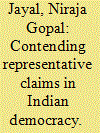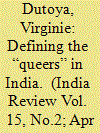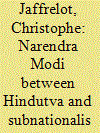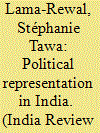|
|
|
Sort Order |
|
|
|
Items / Page
|
|
|
|
|
|
|
| Srl | Item |
| 1 |
ID:
145491


|
|
|
|
|
| Summary/Abstract |
This article essays an interpretation of representative claims articulated in the campaign for the Lok Sabha election of 2014, arguing that this election signals a shift from one dominant type of representative claim to another. The first two claims—the classical liberal view of political representation as an aggregation of preferences and descriptive representation—are embodied by the Congress Party and the social justice parties respectively. These claims are located within the universe of representative democracy, and are sought to be transcended by two new representative claims, encountered in the 2014 election. These are counter-democratic populism and realist Caesarism, signified by the Aam Aadmi Party and the Narendra Modi-led Bharatiya Janata Party, respectively. While these two do not dispense with representative democracy, their claim to provide a more effective or stronger form of democracy indicates a significant departure that redefines the relationship between representation and democracy.
|
|
|
|
|
|
|
|
|
|
|
|
|
|
|
|
| 2 |
ID:
145495


|
|
|
|
|
| Summary/Abstract |
In the last 20 years, research and academic writing on “non-heterosexual” lives, identifications, and sexualities have developed considerably in India, in a context where lesbian, gay, bisexual, and transgender (LGBT) and queer politics have become more and more visible in the public sphere. When it comes to gender and sexuality, researchers are often activists, and scholarship is highly political. In particular, by documenting non-heterosexual lives, practices, and groups, social scientists participate in the construction of social categories that can be mobilized in the public sphere. Using both Pierre Bourdieu’s and Stuart Hall’s views on representation as a discursive process by which representatives shape the group they claim to represent, this article contends that social scientists are engaged in a “work of representation” when it comes to LGBT and queer individuals and groups. Yet, this process is not without tensions, as there is a deep contradiction between the making of an “object of study” that is spoken about, and the promotion of a political subject, who can speak for him- or herself. Drawing on a corpus of about 45 academic publications on LGBT and queer people and issues in the last 25 years, this article explores the contentious discursive formation of “LGBT” and “queer” as analytical and political categories.
|
|
|
|
|
|
|
|
|
|
|
|
|
|
|
|
| 3 |
ID:
145493


|
|
|
|
|
| Summary/Abstract |
A lot of ink has flown over the issue of political under-representation of Muslims in India and over affirmative action measures needed to redress this imbalance. However, a minimal amount of attention has been paid to how Muslims are finding new ways to counter this under-representation. The Ministry for Minority Welfare and subsequent creation of the Minority Welfare Department seem to have expanded the locus of representation for Muslims beyond elections, legislatures, and membership of political parties. Consequently, the number of “Muslim representatives” has increased, in addition to MPs and MLAs who strictly speaking are supposed to be “people’s representatives.” Focusing on two Muslim groups’ engagement with the minority welfare bodies, the article contends that the success or failure of Muslim appointments to state bodies is based not so much on religious differentiation as on the ruling party’s electoral strategies, and their inclusion in these bodies only reinforces their minority status without integrating them entirely in the political process.
|
|
|
|
|
|
|
|
|
|
|
|
|
|
|
|
| 4 |
ID:
145492


|
|
|
|
|
| Summary/Abstract |
After the 2002 pogrom, Narendra Modi, the Chief Minister of Gujarat, shifted his political repertoire from that of a Hindu Hriday Samrat (King of Hindus’ heart) to that of development and Gujaratiness. He claimed that he was a development man (Vikas Purush) and that he represented the 60 million Gujaratis as an aam admi (common man). He projected himself as an embodiment of their identity—asmita. This populist repertoire, which was explicitly articulated during the Sadbhavna mission in 2012, is in tune with the general trend of Indian politics where most of the Chief Ministers claim to epitomize one subnationalism. In the case of Narendra Modi, however, this regional identity was defined in religious terms and reflected a banalization of Hindutva, an original process that was more likely to happen in Gujarat because of the traditional definition of the state’s identity.
|
|
|
|
|
|
|
|
|
|
|
|
|
|
|
|
| 5 |
ID:
145490


|
|
|
|
|
| Summary/Abstract |
Democratic theory has recently been marked by a renewed interest in political representation that is manifest in, and proceeds from, a series of theoretical works that radically open up the concept of representation. This introductory article briefly presents some of the key theoretical propositions that are brought forward by this body of literature, but also by anthropological works on South Asia, namely (i) the intrinsic plurality of the meanings and forms of political representation; (ii) the centrality and pervasiveness of representation processes in political life; and (iii) the constructivist dimension of political representation. As I introduce the four papers in this Special Issue, which collectively demonstrate the heuristic value of an engagement with such debates to understand contemporary Indian politics, I insist that what is at stake is not so much a “crisis” of political representation as a series of events and evolutions that question received knowledge about political representation in India.
|
|
|
|
|
|
|
|
|
|
|
|
|
|
|
|
|
|
|
|
|